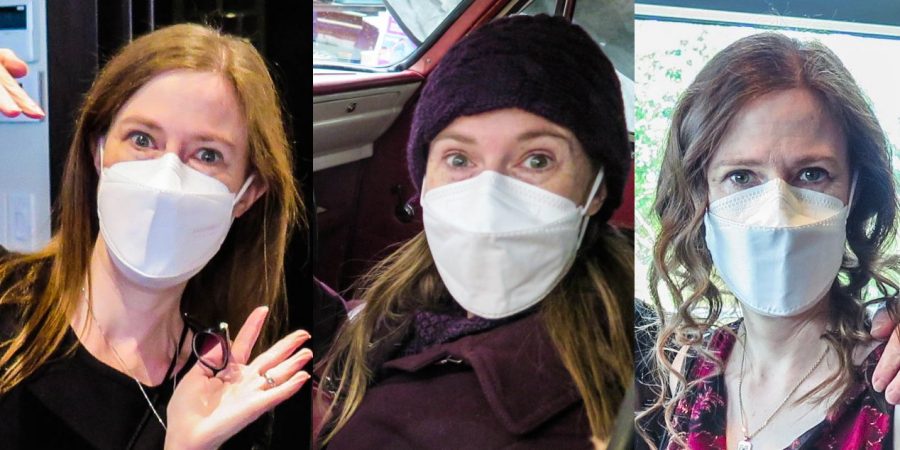Today marks two years since COVID shut down the world we used to know and launched us into this weird pandemic “new normal”. Hopefully by now, you’ve long ago ditched your cloth mask or your baggy blue surgical mask for a proper, well-fitted N95/FFP2 or equivalent mask that actually offers a reasonable amount of protection. With these latest variants like Omicron so much more transmissible than before, a well fitting face mask is an essential tool for everyday life.
To that end, I thought it was time to update this post on masks for petite faces with a post focusing on better masks for petites.
With N95 or equivalent masks, getting a proper fit is essential for them to work. If they aren’t tight enough to form a seal, you’re not going to get the protection that the mask offers. If you’re petite with a particularly small, narrow face, like me, this can present a particular challenge. Luckily, there are now many more options on the market in a range of sizes. Here’s what I’ve had some good luck with as of late:
Obligatory disclaimer: I’m not a doctor or a scientist, and this post should not be taken as expert or medical advice. For the latest advice on how to protect yourself from COVID19, please follow the recommendations of the World Health Organization or of your local or national public health agencies.
Getting the best protection
In case you haven’t gotten the memo yet (it took the WHO nearly two years to admit it), COVID is airborne. That means it spreads via the air between humans, especially in indoor, poorly ventilated spaces. Droplet dogma, which never should have been a thing, is firmly dead. It’s clear that, with the Omicron wave of this winter hitting hard, and new and more transmissible variants forming all the time, you need a better mask. And, ideally, so do the people around you.
This CDC study, from last spring before the Delta wave, indicated that if both the infected and uninfected person were wearing an N95-style mask in close proximity, it could delay transmission time of COVID from 15 minutes to 25 hours. Even one-way masking with an N95 could buy you up to 2.5 hours of protection from an infected individual who is wearing nothing, versus a cloth or surgical mask which gives you only 20-30 minutes:

Of course, that 15 minute transmission is now a pipe dream with Omicron, which seems to be able to spread in seconds. That means that the 25 hours of protection you’d get from your N95 mask is now a pipe dream, too. It’s possible we’d get a few hours, at most. But this is enough for most daily errands, like grocery shopping, medical appointments, or even going to work as long as you go outside for food and drinks. The key is not to remove your mask or break the seal at any point, otherwise you lose the protection from it.
A note on fit testing
The best way to ensure that your mask fits properly and offers you the correct amount of protection is to get it professionally fit tested. Unfortunately, here in Quebec, there’s no way for a member of the general public to access fit testing, since it is reserved only for people who work in industries that require N95 masks, such as healthcare or construction workers. Over the last two years, I’ve investigated this extensively, but even private services don’t offer individual testing.

As an alternative, there are many Youtube videos and online guides of how to DiY your own fit test at home. I’ve tried several of these, with varying results. You can do your own research on the best method to get your fit tested. Ultimately, a good quality mask, even non-professionally fit tested, will still offer significantly better protection than a cloth or loose-fitting surgical mask. And I’ve personally found that, if my glasses aren’t fogging up with my mask on, it’s a decently good indication that the fit is good.
What do the numbers mean?
You may be confused by all the designations and certifications.
- N95 / FFP2 are, respectively, the US and European equivalents of the most common style respirator mask. These masks have head straps and are certified to block 95% of particle transmission if fit tested properly. They are the minimum level required for many high risk healthcare workers, and a number of European and Asian countries require them to be worn by the public in crowded spaces like transit, too.
- KN95 / KF94 are the, respectively, Chinese and Korean designations for earloop-style masks that also block 95% of particles if worn correctly. There are many North American equivalents to these, shown below. The caveat is that the earloop-style masks will never fit quite as snugly as those with headstraps, so they aren’t certified for medical use. But, non fit-tested, they arguably offer almost as good protection, and many people, myself included, find them more comfortable for extended daily wear.
- N99 / FFP3 are, again, US and EU designations for roughly equivalent masks, only these ones are certified to block 99% of particles, as opposed to 95%, if fit tested. In other words, they offer a higher level of protection than N95s, but they’re also more expensive and, for some people, can be harder to breathe in for extended periods. Like the N95 masks, N99s also have head straps. If you see an earloop style mask advertised as N99, it’s false advertising.
- Elastometric respirators are reusable masks with replaceable filters, which can block close to 100% of all particles. They typically consist of a large, prominent face mask that offers a high degree of protection, but is bulky and rather conspicuous. I know some friends who swear by them and will never go back to disposable masks. Personally, I prefer a the balance of function and fashion offered by the above styles.
Finding your mask size
I happen to have a very petite face, and I find that most adult sized masks are too large for me. But luckily, masks now come in an array of sizes, to fit small children all the way up to large adults.
Here’s a handy size chart from Canada Strong Masks, one of my favourite places to buy good quality masks online in Canada:

Personally, I’ve found that I get the best fit from the CA-N95 size SMALL masks (update: now called Bretheteq), followed closely by the Vitacore CAN99. The Dent-X 510s are also okay on me, and they’re what I wore for most of the last year until recently getting a sample of the CA-N95 smalls. For reference, my partner, who is a man with an average-sized face for a guy, gets a good and comfortable fit from the DentX 508 masks.
Still not sure what size you are? Canada Strong Masks has recently started offering a sample kit of their various masks. Each kit comes with an XS (kids), S, M, and L mask in two different colours, so you can try them on at home and determine your size.
Earloop KN95/KN94 masks
CanadaMasq CA-N95 in SMALL: My current favourites. These are KF94-style earloop masks that are made in Canada and offer a great, comfortable fit on my petite face. They also come in medium, large, and a kids’ extra small size:
They run about $1.50 each for a 10-pack from Canada Strong, and each one can be worn for up to 8 hours of cumulative use, which is usually good for several days. I find these to be extremely comfortable for longer periods of time, especially since the fabric is stiffer and holds its shape away from my nose while still forming a secure seal at the sides and on the nose. I can wear my glasses in wintertime with these masks and they don’t fog up. Win!
ETA October 2022: CanadaMasq now has its new BreatheTeq masks, which are sized the same but are meant to be more breathable than the original styles. The small size is available in black or light grey. I have yet to try these, but am quite keen to test them on my next reorder. I’ll keep you posted!
DentX FN-N95-510: This was the first smaller-fit adult respirator I found last year that fit my face, and I still have a huge stock of these. They are ever-so-slightly bigger than the CanadaMasq ones, giving them a bit of a looser fit, but they still are quite good on my very petite face. And they might be the perfect fit on many women who aren’t quite as petite as I am; my mom, for instance, loves these.

Dent-X is also a Canadian company and their masks are made in Ontario. They sell these in two sizes: The 510s, shown here, fit a small-to-average face, while the 508s fit an average-to-large one. (For context, my partner, who has an average-sized male face, wears the 508s almost exclusively.)
Headstrap N95 / FFP2 masks
Vitacore CAN95 Surgical Respirator: If you prefer a headstrap-style N95 mask for added protection, these Vitacore masks give a pretty decent fit on small to medium sized faces:

Vitacore’s masks are all made in Canada as well, and these ones are Health Canada-authorized as surgical respirators. They also sell an earloop version, the CAN95e, for those who prefer it.
Personally, I find that the rounder shape of these, versus the wider and flatter shape of the KF94 style above, doesn’t fit me quite as well. I also find that the headstraps have a bad habit of sliding down off the back of my head, making them harder to secure over time. However, they are relatively petite-friendly, if you’re looking for a headstrap version.
Headstrap N99 / FFP3 masks
Vitacore CAN99 NIOSH-certified Respirator: For higher risk situations, I opt for these headstrap-style Vitacore N99-equivalent masks:

They’re technically certified as N95 by NIOSH in the US, but they have FFP3 certification in Europe, meaning they block at least 99% of particles. The fit for petites is actually surprisingly good. I don’t find them as comfortable to wear for longer periods of time as the CanadaMasq earloop masks. But they passed my home makeshift fit tests quite well.
Shopping resources (Canada):
- Canada Strong Masks: My go-to site to order masks online.
- Vitacore: To order the N99s above.
- Masks Supply Canada: If Canada Strong is out of stock, they also carry DentX masks.
Petite readers: What are your favourite face respirator masks that fit well on small faces? Tell me in the comments!






